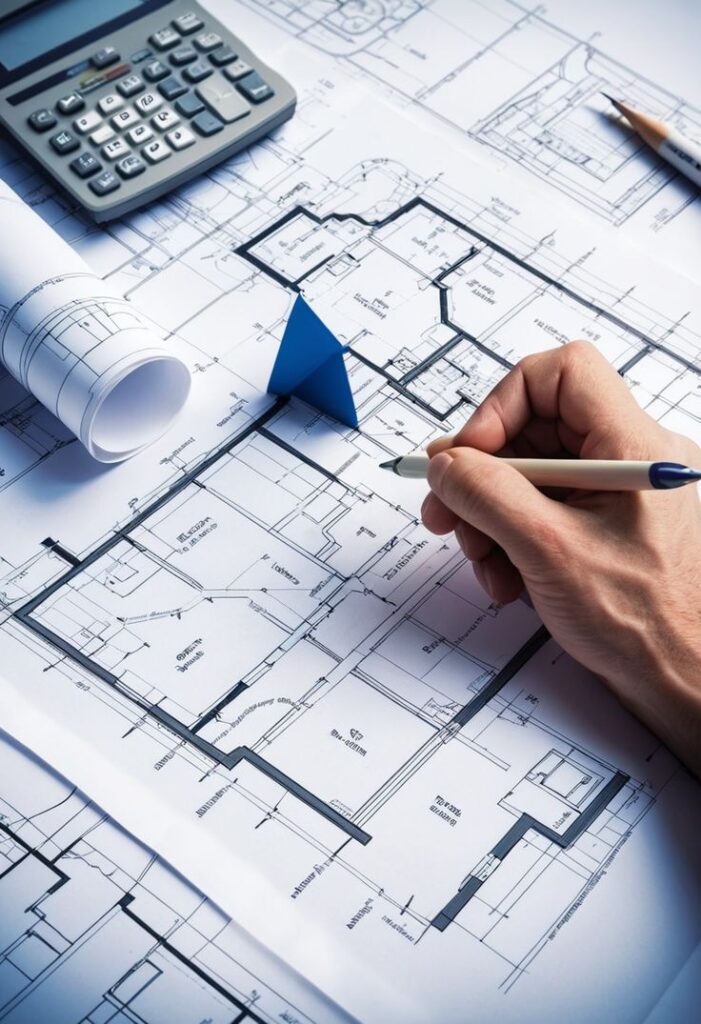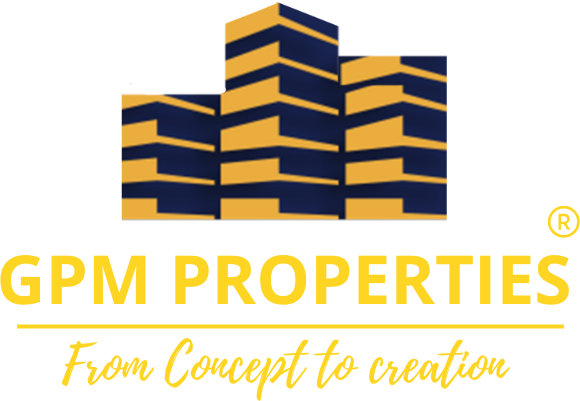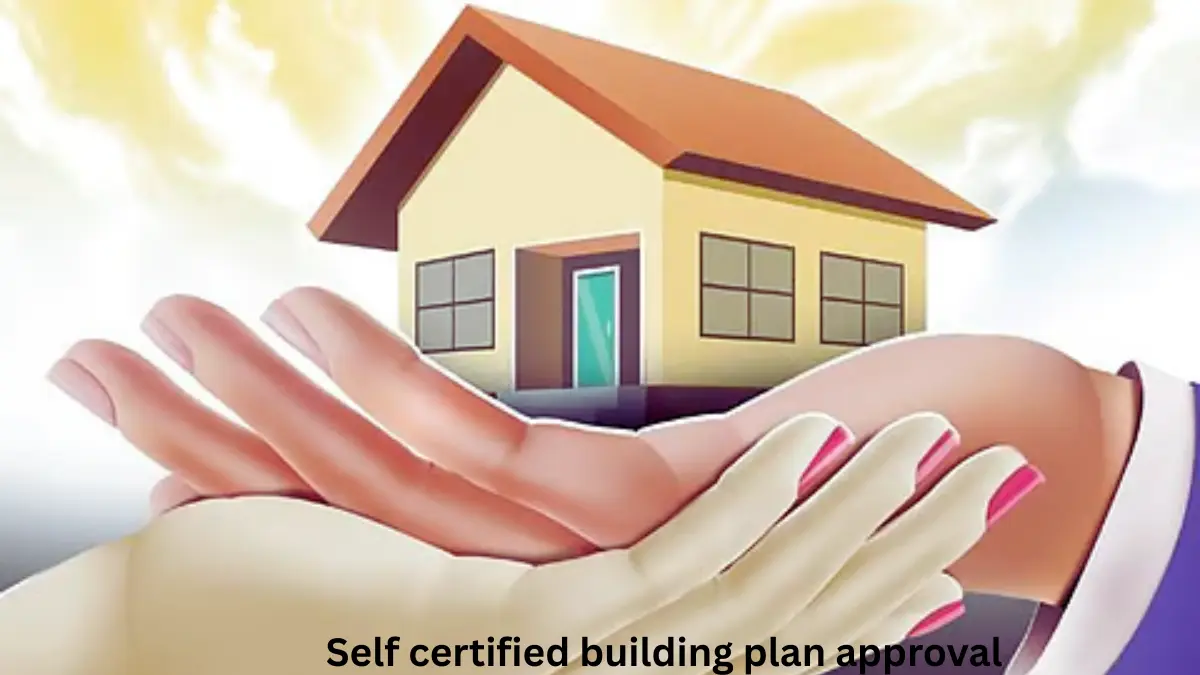If you’re planning to construct a new building or renovate an existing one, Self Certified Building Plan Approval can save you both time and effort. This streamlined process allows licensed professionals to approve building plans without the lengthy wait times associated with traditional municipal approvals. In this guide, we’ll explain what self-certification means, how it works, its benefits, eligibility, and step-by-step proceduresGO for Self-Certification – Information Table
Contact Information
| Details | Information |
|---|---|
| Address | Second, Third and Fourth floor, E & C Market Road, Koyambedu, Chennai – 600 107 |
| ctcptn@tn.gov.in | |
| Department | The Department of Housing and Urban Development, Tamil Nadu |
| Last Update | 24-07-2024 |
What is Self Certified Building Plan Approval?

Self Certified Building Plan Approval is a fast-track system where qualified architects or engineers certify a building plan according to local building regulations. This eliminates the need for lengthy verification by government authorities before starting construction, provided all rules are followed.
Many state urban development bodies, including CMDA (Chennai Metropolitan Development Authority) and DTCP (Directorate of Town and Country Planning), have implemented this system to speed up construction approvals.
Why Choose Self-Certification for Building Plan Approval?
- Faster Approvals – Start your construction project without waiting months for traditional approvals.
- Reduced Paperwork – Minimal documentation compared to conventional processes.
- Cost-Effective – Fewer visits to offices, less consultant time, and quicker project start.
- Transparency – Compliance is confirmed upfront, reducing chances of rejection.
- Encourages Professional Responsibility – Licensed professionals are accountable for the accuracy of the plan.
Who is Eligible for Self Certified Building Plan Approval?

Only certain professionals and property types are eligible:
- Licensed Architects and Structural Engineers registered with the municipal authority.
- Residential buildings up to a certain height and area (varies by state regulations).
- Commercial projects with limited floor space index (FSI) as per local laws.
- Plots with clear legal title and no ongoing disputes.
Documents Required for Self-Certification
Before applying, ensure you have:
- Ownership proof (sale deed, patta, or allotment letter)
- Latest property tax receipt
- Encumbrance certificate
- Site plan, layout, and architectural drawings
- Structural stability certificate
- Undertaking from the architect/engineer
- Soil test report (if applicable)
Step-by-Step Process for Self Certified Building Plan Approval
Step 1 – Hire a Licensed Professional
Engage an architect or structural engineer approved by the local authority.
Step 2 – Prepare the Building Plan
The professional will create a plan that complies with CMDA/DTCP or municipal norms.
Step 3 – Submit Online Application
Many states allow online submission via their development authority’s portal.
Step 4 – Self-Certification by the Professional
The architect/engineer certifies that the plan meets all rules and signs the application.
Step 5 – Pay the Applicable Fees
Fees are usually based on plot size, type of construction, and FSI.
Step 6 – Instant Approval
Once submitted, approval is granted immediately or within a few days.
Step 7 – Start Construction
Construction can begin immediately after receiving the approval.
Step-by-Step Guide: Applying for Self-Certified Building Plan Approval in Tamil Nadu
If you are eligible under Tamil Nadu’s self-certification scheme, you can apply for building plan approval entirely online via the Single Window Portal. Here’s how to do it:
1. Login to the Portal
- Open your browser and visit: https://onlineppa.tn.gov.in/SWP-web/login
- Click on the Login button.
- Enter your User ID, Password, and the Captcha code.
- Once logged in, you will see a menu with various modules on the left.
2. Start a Self-Certification Application
- From the menu, go to Self Certification → Self Certification List.
- Click on the Create icon to start a new application.
- Eligibility Condition: Applicable only for Ground or Ground+1 buildings up to 7m height, with a built-up area ≤ 3,500 sq ft on a plot ≤ 2,500 sq ft.
- If your project exceeds these limits, you must apply through the normal building plan process.
3. Fill in Applicant & Plot Details
- Applicant details will auto-fill from your registration.
- Add your Relation Type and Relation Name, then save.
- Enter District, Taluk, Village, Local Body type, and Office details.
- Select the Plot Category and save.
4. GIS Mapping & NOC Check
- Locate your site using the GIS map tool.
- The system will check if a No Objection Certificate (NOC) is required.
- If NOC is required → Apply via the normal plan approval process.
- If NOC is not required → Continue with self-certification.
5. Enter Building Details
- Choose the Type of Building Permission: New, Revision, or Additional.
- Fill in existing and/or proposed floor area as applicable.
- Save the building details.
6. Upload Required Documents
- Upload all documents from the checklist:
- Site photographs
- Sale deed
- Patta/TSLR
- Building plan signed by a registered architect/engineer
- Save the document checklist.
7. Self-Declaration & E-Sign
- Review the declaration statements and agree.
- E-sign the Permit Letter and Building Plan Drawing Letter using your Aadhaar number and linked mobile OTP.
8. Payment
- Proceed to payment via the integrated gateway.
- Multiple payment modes are available (Net banking, UPI, cards, etc.).
9. Download Approval
- After successful payment, download:
- Permit Letter
- Building Plan Drawing Letter
- Fee Receipt
- Inspection Letter
- Your approved permit will include a QR Code for verification.
Advantages Over Traditional Approval
| Feature | Traditional Approval | Self Certified Approval |
|---|---|---|
| Approval Time | 2–6 months | Instant to a few days |
| Site Visits | Multiple | Minimal |
| Paperwork | High | Low |
| Professional Accountability | Shared with authority | Fully on professional |
| Transparency | Medium | High |
Common Mistakes to Avoid
- Submitting incomplete documents
- Ignoring setback and height restrictions
- Hiring unlicensed professionals
- Providing inaccurate plot measurements
- Skipping soil testing for larger projects
Role of CMDA and DTCP in Self-Certification
- CMDA (Chennai Metropolitan Development Authority) – Manages approvals in Chennai and its metropolitan area.
- DTCP (Directorate of Town and Country Planning) – Oversees plan approvals in non-metropolitan towns and rural areas.
Both agencies have self-certification schemes, but rules and eligibility vary.
How to Find the Best Self-Certification Experts Near You
Look for professionals who:
- Have valid municipal registration
- Possess experience in self-certification projects
- Offer transparent pricing
- Provide complete service from design to documentation
Example:
Mon–Sat: 09:00 AM – 11:00 PM
9176522727 / 9176532727 / 9176552727
Services Offered:
- Architectural Drawings
- Building Approval Drawing (CMDA & DTCP)
- Building Structural Drawing
- Soil Testing
- Residential & Commercial Building Contracting
- Flat & Layout Promotion
- Building Repair & Rehabilitation
- Interior Designing
Advantages of Choosing Top Apartment Builders in Chennai
- Quality Construction – Reputed builders like GPM Properties and others ensure durable materials, strong foundation, and modern design standards.
- Transparency – Leading builders follow RERA guidelines, ensuring clear agreements, timely possession, and fair pricing.
- Amenities & Facilities – Top builders provide gated communities with gyms, swimming pools, power backup, parking, and 24/7 security.
- Better Investment Value – Apartments from well-known builders usually appreciate faster in resale value.
- Timely Delivery – Professional construction firms adhere to strict project timelines, reducing risks of delays.
- Customer Support – Big names often have dedicated after-sales and maintenance teams.
Disadvantages of Choosing Top Apartment Builders in Chennai
- Higher Cost – Premium builders charge more due to brand value, luxury finishes, and added amenities.
- Standardized Designs – Sometimes apartments lack customization, as big builders follow a set architectural style.
- Additional Charges – Maintenance fees, clubhouse charges, and hidden costs can increase the overall budget.
- Limited Availability – Popular builders often have projects sold out quickly, making booking competitive.
- Urban Congestion – Many top builders focus on prime city areas, which may lead to traffic congestion and higher living expenses.
FAQs
Q1: What is self-certified building plan approval?
A1: Self-certified building plan approval is a process where licensed architects or engineers can submit building plans directly to the local authority for approval without going through the standard lengthy verification process. This helps speed up project execution.
Q2: Who is eligible for self-certified building plan approval?
A2: Licensed architects, registered engineers, or empanelled professionals approved by the local municipal body are eligible to submit plans under the self-certification scheme.
Q3: What are the benefits of self-certified building plan approval?
A3: Benefits include faster approval timelines, reduced administrative delays, simplified documentation, and quicker project commencement.
Q4: Is self-certified approval applicable for all types of buildings?
A4: No, it typically applies to residential and certain commercial projects within a specific size and height limit as defined by local building regulations.
Q5: What documents are required for self-certified building plan approval?
A5: Common documents include the completed application form, ownership proof, building plan drawings, structural stability certificate, soil test report (if applicable), and architect/engineer license details.
Q6: How long does the self-certified building plan approval take?
A6: In most cases, approvals can be granted within 7–15 working days, depending on the municipal authority and project type.
Q7: Can self-certified approvals be rejected?
A7: Yes, if the submitted plans do not meet the building codes, zoning laws, or required safety standards, the authority can reject or request modifications.
Q8: Is the self-certified process available online?
A8: Many municipalities have moved to online portals where professionals can submit building plans, upload documents, and track approval status digitally.
Q9: Does self-certification guarantee hassle-free construction?
A9: While it speeds up approvals, construction still needs to comply with all building regulations. Any violations during construction may lead to penalties or cancellation of the approval.
Q10: How can I find a professional for self-certified building plan approval?
A10: You can contact licensed architects or building planners in your city, check the empanelled professionals list on your local municipal website, or consult reputed building contractors.
Conclusion
The Self Certified Building Plan Approval process is a game-changer for homeowners, builders, and architects who want to save time and avoid bureaucratic delays. By working with a licensed professional and ensuring compliance with all regulations, you can get your project off the ground quickly and efficiently.


